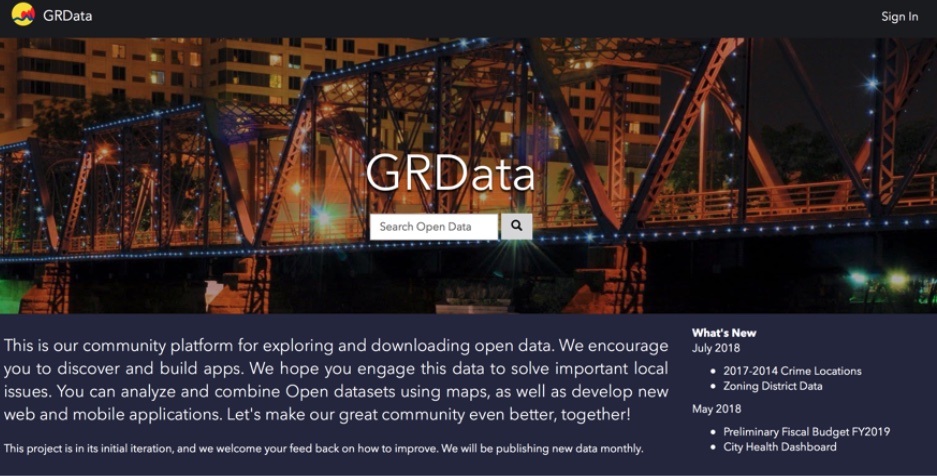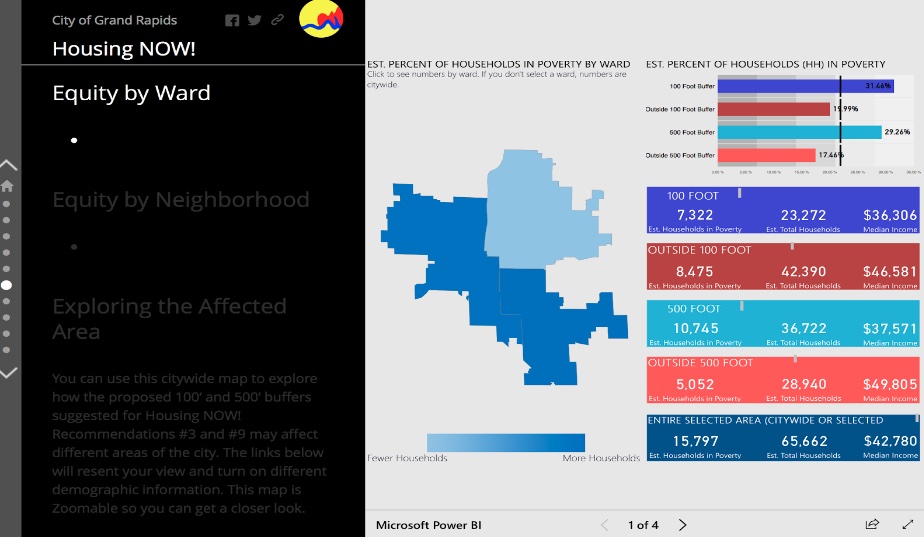Grand Rapids, MI Case Study
“We are one city, one community, and we rise and fall together. Without racial equity, we cannot be prosperous.”
-Mayor Rosalyn Bliss
Racial Equity as a Citywide Initiative
Racial equity is one of the most significant issues facing cities across the country. As cities continue to grow, there is a growing need for cities to have an increased focus and be cautious of the potential creation of social and economic divides that could destabilize their city. The City of Grand Rapids is currently facing this issue as one of the fastest growing U.S. cities with a large economy, ranking #1 with employment growth at 4.4% in 2016. Despite this ranking and like many other cities, Grand Rapids suffers from economic, housing, health, and development inequality where there are significant disparities and creating a huge divide.
In 2017, Mayor Rosalynn Bliss announced in her State of the City address, Grand Rapids’ commitment to addressing significant disparities in access to resources and services for minorities through racial equity. Mayor Bliss stated, “These neighborhoods are more racially and ethnically diverse than the city as a whole…these neighborhoods are economically unstable with low median household incomes and high unemployment. We are one city, one community, and we rise and fall together. Without racial equity, we cannot be prosperous.”
Building on this commitment and as part of the What Works Cities initiative, Grand Rapids and the Center for Government Excellence (GovEx), held a series of meetings to determine the best way to improve equity in the city. It was determined the best way to improve racial equity in Grand Rapids was to first analyze the state of equity in Grand Rapids through data management technical assistance. In November 2017 Grand Rapids entered into GovEx/WWC engagement to advance its ability to deliver results for its residents by establishing data management practices, in order to bring data and evidence into the decision-making process to increase equity and the quality of life in the City, enabling progress towards the City’s goals and connecting with the community in the process.
In February 2018, The City of Grand Rapids was one of 35 cities selected as a city champion in the Bloomberg Philanthropies Mayor’s Challenge. Grand Rapids will create a public dashboard that maps inequality hotpots in Grand Rapids.
Improving Grand Rapids Data Management Practices and Community Engagement
From the beginning of the engagement, Grand Rapids goals included establishing a data governance committee, convening an initial meeting with data governance committee, inventorying relevant datasets to assess data availability and quality, prioritizing datasets for release, and engaging internal and community stakeholders that will ultimately help the city improve their decision-making process to increase equity.
Grand Rapids created a 36-member data governance committee that includes staff from several departments and external community stakeholders to discuss establishing foundational data management practices in the priority area of equity. The data governance committee convened its first meeting during our engagement and began to lay the groundwork for how Grand Rapids will address data management, assess data quality, prioritize equity datasets for release, and engage internal and community stakeholders. The data governance committee serves as a key component in Grand Rapids’ plan to improve its ability to use data as a strategic asset and leverage it more effectively for decision-making, providing efficient services, and laying the foundation for advanced data practices.
Next, Grand Rapids assessed their data availability in the equity priority area by conducting a pilot data inventory with select departments then expanding city-wide. Grand Rapids initial data inventory successfully collected over 100 datasets. The team also assessed the quality of the collected datasets by conducting a data quality survey where they gained further understanding of the state of its data systems both internal and external. By the end of the engagement, 21 datasets passed a data quality check for publishing on the open data portal.
The data inventory and data quality survey opened discussions with internal staff about recurring issues with data collection, overall quality of data, as well as the availability of data. This allowed the data governance team to begin initial discussions and create plans to establish city-wide data standards to reduce data quality issues, as well as engage partner departments to increase data availability and eliminate red tape through training. About 50 city employees were trained in the data quality review process, representing 21 out of 41 departments in the City of Grand Rapids. The Grand Rapids team also conducted a Business Intelligence & Open Data presentation to the City Commission in order to continue to foster leadership buy-in and support.
The Grand Rapids team began prioritizing equity datasets by first engaging staff internally to receive feedback then engaging community stakeholders. Grand Rapids convened its first community stakeholders meeting during our engagement that included representatives from the local university, civic tech, nonprofits, and neighborhood liaisons. The community stakeholders meeting not only allowed community members to provide feedback on equity datasets for release but also provide feedback on Grand Rapids data management practices and open data efforts surrounding equity. Community members enthusiastically discussed how Grand Rapids can leverage their partnership with them and other community stakeholders to increase the city’s capacity. This led to the addition of 13-external data governance committee members to assist in the city’s efforts. Grand Rapids now meets with external stakeholders on a routine basis in order to collaborate on projects that further their equity work and expand their capacity.
 During our engagement Grand Rapids launched its first Open Data Portal, GRDATA, in February 2018. Since then 16 datasets have been published and about 4,500 users have used the published datasets. The team also launched the Housing NOW! Dashboard that maps areas of inequality and is used to address proposed changes to the Zoning Ordinance and increase housing supply. Since its creation, the Housing NOW! Dashboard has increased resident engagement and knowledge about zoning ordinance recommendations creating a more informed resident. By having the dashboard, residents and decision-makers are able to look at the same information and further discussions about the lack of equity in their neighborhoods. So far, there are about 1,650 unique visitors and 5,300 views on the Housing NOW! Story map.
During our engagement Grand Rapids launched its first Open Data Portal, GRDATA, in February 2018. Since then 16 datasets have been published and about 4,500 users have used the published datasets. The team also launched the Housing NOW! Dashboard that maps areas of inequality and is used to address proposed changes to the Zoning Ordinance and increase housing supply. Since its creation, the Housing NOW! Dashboard has increased resident engagement and knowledge about zoning ordinance recommendations creating a more informed resident. By having the dashboard, residents and decision-makers are able to look at the same information and further discussions about the lack of equity in their neighborhoods. So far, there are about 1,650 unique visitors and 5,300 views on the Housing NOW! Story map.
 The City consistently looked for ways to translate these practices to other focus areas across the organization, setting the stage for it to build on the success of its WWC engagement. A few unexpected wins from our engagement include the development and launch of the Medical Marijuana Analysis dashboard developed based on best practices from the creation of the Housing NOW! dashboard. The Medical Marijuana Analysis dashboard analyzes the potential volume and impact of medical marijuana facilities in Grand Rapids, helping decision-makers make zoning recommendations.
The City consistently looked for ways to translate these practices to other focus areas across the organization, setting the stage for it to build on the success of its WWC engagement. A few unexpected wins from our engagement include the development and launch of the Medical Marijuana Analysis dashboard developed based on best practices from the creation of the Housing NOW! dashboard. The Medical Marijuana Analysis dashboard analyzes the potential volume and impact of medical marijuana facilities in Grand Rapids, helping decision-makers make zoning recommendations.
Also, the City of Grand Rapids created a new Business Intelligence Division (BI) under the Director of Customer Service, effective July 1, 2018. The creation of this position was not a part of the city’s plan prior to our engagement, but as a direct result of our work on equity that became a city priority.
What’s Next for Grand Rapids?
Establishing a data governance committee is just the foundation for developing and implementing effective data management practices. Through our WWC engagement, Grand Rapids has the foundation to further enhance and improve its practices, in order to provide further analysis and insight of the state of racial equity in the city. Grand Rapids will maintain and expand its data management practices by expanding the capacity of its data governance committee, implementing data standards, and improving its community engagement strategies.
Expand capacity and engage internal staff. The Grand Rapids team will expand its capacity by including external stakeholders on its data governance committee, in order to increase skills and increase community engagement. Establish working groups focused on data quality, training internal staff, and community engagement. Team will also establish a communications platform for the data governance committee and internal staff that disseminates information about Grand Rapids’ data management and open data. With continued support from leadership and a routine meeting schedule, the data governance committee will be a driving force in implementing data management practices not only in the topic focus area of equity, but other priorities of the City.
Making changes stick. Grand Rapids team will create a policy or directive that outlines data standards, ensures data quality, and outlines routine data inventory maintenance. Creating a routine maintenance schedule of the data inventory, continuing to assess the quality of data, and making efforts to fix data quality issues by establishing data standards and improving data collection methods will help Grand Rapids move forward in preparing its data for advanced analytics and visualizations. Team will continue to engage city departments on the importance of data quality by providing training on new data standards and data collection protocols. Team will also continue to release equity datasets on the Open Data Portal and create dashboards.
Commit to publicly post schedules of datasets on the Open Data Portal. Publicly committing to the release of datasets on a schedule sends a strong message that Grand Rapids is serious about open data. An open schedule also helps users understand what to expect from the city, and builds buy-in by routinely demonstrating progress.
Engage community stakeholders. The Grand Rapids team will meet with community stakeholders on a routine basis and incorporate feedback into the decision-making process. Creating an Engagement plan encourages routine discussions/feedback and outlines how the data governance committee will engage with both internal and community stakeholders and will help Grand Rapids create a build with approach in its equity focused data management/open data practices.
Why This Matters for Your Work?
As cities continue to grow and become more diverse, cities need to be proactive in making sure their cities live in an equitable society. Analyzing the state of equity in your city can provide greater insight in how your city is doing and where improvements can be made. In order to conduct this analysis, your city must first conduct a thorough analysis of its data availability related to equity and also assess the quality of data before it is used for any analysis. The creation of a data governance committee that has leadership buy-in is a key component in revolutionizing the cities data management practices to conduct an equity analysis. A data governance team will not only lead the way in improving data management practices and improving data quality, but will serve as the leads in changing the culture in city government about how data can be used effectively to improve the lives of residents.
To keep up with the work Grand Rapids is doing, check out the following:
Data Points Podcast Episode 55 – Creating Racial Equity in Grand Rapids